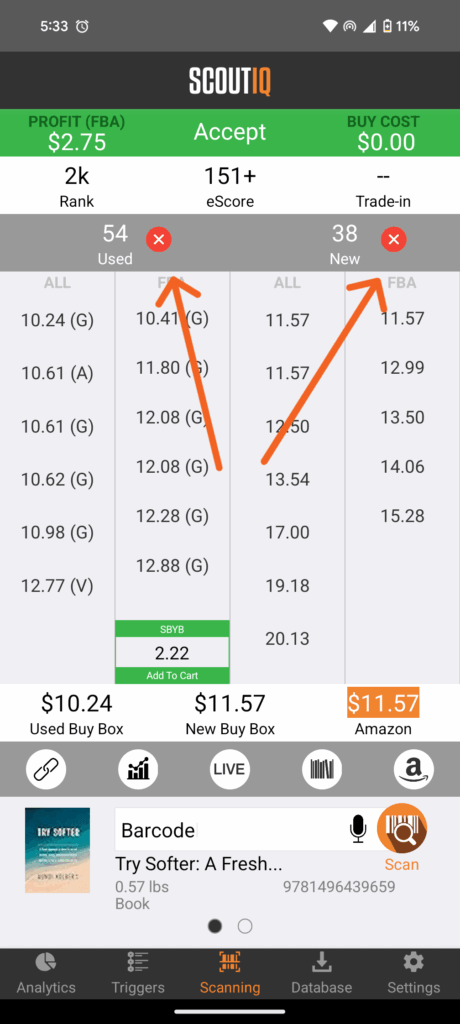- Blog
-
For Sellers
What are gated categories on Amazon?
Not every product you source is sellable on Amazon. Here’s a quick guide to help you out.

Picture this: you find what looks like a goldmine product at your local thrift store, buy 50 units at $3 each, then discover Amazon won’t let you sell it. You’re out $150 plus the time spent sourcing, and you’re stuck with inventory you can’t move.
This scenario plays out daily for Amazon sellers who don’t understand gated categories. These are product categories where Amazon requires special approval before you can list items for sale. The approval process exists to protect customers from counterfeit goods, ensure product safety, and maintain marketplace quality standards.
The good news? You can avoid these costly mistakes by understanding which categories are gated and checking restrictions before you buy inventory. Let’s break down exactly what you need to know.
Complete list of gated categories (2025)
Amazon’s gated categories fall into three main groups based on how difficult they are to access. Some require extensive documentation and business credentials, while others simply restrict certain product conditions.
Approval always required
These categories have the strictest requirements and often require substantial business credentials or specialized expertise.
Fine Art
Amazon accepts applications for Fine Art but limits new sellers significantly. You need to demonstrate expertise in fine art sales, provide extensive business documentation, and meet strict performance standards. The category covers paintings, sculptures, drawings, and other original artworks valued typically above $100.
Collectible Coins
Amazon stopped accepting new seller applications for Collectible Coins entirely. Existing approved sellers must maintain membership in organizations like the Professional Numismatist Guild or the Industry Council for Tangible Assets. Additionally, 70% of inventory must be graded by Numismatic Guaranty Company (NGC) or Professional Coin Grading Service (PCGS), or sourced directly from government mints in original packaging.
Entertainment Collectibles
Like coins, Entertainment Collectibles no longer accepts new applications. This category covers movie memorabilia, autographed items, and entertainment-related collectibles. All products require authentication from approved third-party services.
Sports Collectibles
Sports memorabilia follows the same pattern. No new seller applications accepted. Products must be authenticated by recognized companies like Professional Sports Authenticator (PSA). Trading cards have some exceptions for factory-sealed boxes and packs.
Grocery & Gourmet Foods (certain subcategories)
The main Grocery category is open, but several subcategories require approval:
- Dietary supplements
- Alcoholic beverages
- Products requiring FDA approval
- Items with specific labeling requirements
Temperature-controlled foods like frozen items need extensive documentation proving your cold-chain capabilities.
Brand and product-specific restrictions
These categories allow some products while restricting others based on brands, materials, or specific product types.
Beauty and cosmetics
The general Beauty category is open for basic products like shampoo and lotion. However, the Cosmetics and Skin Care subcategory faces restrictions for products making drug claims, containing prohibited ingredients, or requiring FDA approval.
Key restrictions include:
- No products with methylene glycol
- No permanent eyelash dyes
- No skin creams containing mercury
- No henna products for direct skin application
Jewelry classification
Amazon distinguishes between fine and fashion jewelry with specific material requirements. Fine jewelry includes anything made with precious metals (gold, platinum, palladium) or containing genuine gemstones and cultured pearls.
Fine jewelry requires approval and includes:
- Gold, platinum, and palladium pieces
- Natural diamonds, emeralds, rubies, sapphires
- Cultured pearls (Akoya, Tahitian, South Sea)
- Precious gemstones like tanzanite and jade
Fashion jewelry remains open and covers base metals, cubic zirconia, simulated stones, and shell pearls.
Electronics and brand approvals
Consumer Electronics allows most sellers, but specific brands require individual approval. Popular brands like Apple, Samsung, and Sony often restrict who can sell their products to combat counterfeiting.
The category also restricts:
- Products without proper FCC certification
- Items containing prohibited substances
- Modified or tampered electronics
Music, Video & DVD
These categories require approval across the board. Amazon wants to ensure sellers can provide authentic products and handle licensing requirements properly. The approval process includes performance history requirements and business documentation.
Condition restrictions
Many categories limit which product conditions you can sell, even if the category itself doesn’t require approval.
New-only categories
Several categories only accept new, unused products:
- Baby Products (excluding apparel)
- Beauty products
- Grocery & Gourmet Foods
- Health & Personal Care items
These restrictions exist primarily for safety and hygiene reasons. Parents want new baby products, and used beauty items pose contamination risks.
Limited condition categories
Other categories restrict certain conditions:
- Toys: New and collectible only (no used)
- Automotive: New only (some used parts with restrictions)
- Games: New and collectible only
The restrictions often relate to safety standards, authenticity concerns, or regulatory requirements specific to each product type.
👉 Want a more in-depth list? Read our guide on all Amazon categories.
How to apply for gated categories
The application process varies by category but generally requires three key elements: business documentation, product photos, and purchase invoices dated within 180 days.
Amazon reviews applications within 2-7 business days, though complex categories like Fine Art may take longer. Your seller performance metrics also factor into approval decisions, so maintain low defect rates and strong customer feedback.
For detailed application instructions and documentation requirements, check out our complete guide on how to get ungated on Amazon.
How Seller 365 prevents gating mistakes
Smart sourcing means checking restrictions before you buy inventory. Fortunately, Seller 365’s sourcing tools integrate restriction checking directly into your workflow, saving you from costly mistakes.
ScoutIQ for books and media

When scanning books at thrift stores or library sales, ScoutIQ immediately shows if you can sell that item. The app flags restricted titles and shows your selling permissions in real-time. No more buying books only to discover you need approval for the Music category.
Scoutify for retail arbitrage
Scoutify checks category restrictions as you scan products in stores. The app alerts you to gated categories and brand restrictions before you make purchasing decisions. This feature alone can save hundreds of dollars in unusable inventory.
ScoutX for product research
ScoutX displays restriction status directly on Amazon product pages. See category limitations, brand restrictions, and condition guidelines without jumping between multiple tools. The Chrome extension streamlines research so you can make informed sourcing decisions quickly.
Know before you go
In the end, understanding gated categories isn’t just about following rules. It’s about protecting your investment in inventory. Every dollar spent on products you can’t sell is a dollar that could have gone toward profitable inventory instead.
The key is building restriction checking into your sourcing routine. Use tools that show you restrictions in real-time, understand the difference between category and brand approvals, and always verify selling permissions before making large inventory purchases.
Ready to source smarter and avoid costly gating mistakes? Try Seller 365 free for up to 14 days and get restriction checking built into every sourcing decision.
Your future self will thank you when you’re selling profitable inventory instead of sitting on products you can’t list.






















